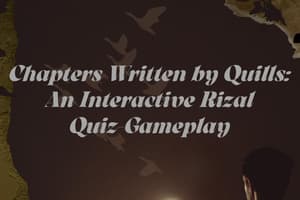Podcast
Questions and Answers
What are some examples of quiz-based narratives in literature?
What are some examples of quiz-based narratives in literature?
Choose-Your-Own-Adventure Books, Interactive Fiction, Hypertext Fiction
How do Choose-Your-Own-Adventure Books engage readers?
How do Choose-Your-Own-Adventure Books engage readers?
By offering a variety of options at turning points which lead to different outcomes.
What is Interactive Fiction also known as?
What is Interactive Fiction also known as?
"ChoiceScript" or "Inform"
Give an example of an Interactive Fiction title.
Give an example of an Interactive Fiction title.
How does Hypertext Fiction differ from other quiz-based narratives?
How does Hypertext Fiction differ from other quiz-based narratives?
What is the purpose of interactive elements in quiz-based narratives?
What is the purpose of interactive elements in quiz-based narratives?
What is gamified literature and how does it enhance the reading experience?
What is gamified literature and how does it enhance the reading experience?
How do short-answer quizzes contribute to enhancing reading comprehension?
How do short-answer quizzes contribute to enhancing reading comprehension?
Explain the purpose of matching quizzes in educational contexts.
Explain the purpose of matching quizzes in educational contexts.
How do true/false quizzes contribute to promoting critical thinking?
How do true/false quizzes contribute to promoting critical thinking?
What is one benefit of quizzes in literature related to promoting active learning?
What is one benefit of quizzes in literature related to promoting active learning?
How can quizzes in literature encourage readers to develop their own interpretations of the text?
How can quizzes in literature encourage readers to develop their own interpretations of the text?
Flashcards are hidden until you start studying
Study Notes
Quizzes in Literature: Exploring Interactive Narratives
Quizzes have evolved beyond their traditional role as assessment tools in classrooms. In the realm of literature, these interactive elements have transformed how readers engage with stories, challenging them to navigate deeper layers of narrative and gain a more immersive experience. Let's delve into the fascinating world of quizzes within literature.
Quiz-Based Narratives
Quiz-based narratives are stories that incorporate challenges or choices for readers, which guide their progress through the text. These interactive elements can be found in various literary forms, including:
-
Choose-Your-Own-Adventure Books: These popular titles, such as the "Treasure Island" and "House of Danger" series, offer readers a variety of options at turning points, which lead to different outcomes. This format encourages readers to revisit the story and explore alternate paths.
-
Interactive Fiction: Also known as "ChoiceScript" or "Inform," interactive fiction presents a textual or graphical story in which readers make choices that influence the plot. Notable examples include "Zork," "A Mind Forever Voyaging," and "Galatea."
-
Hypertext Fiction: This format presents a text-based narrative with hyperlinks that connect to other sections of the text. Readers can click on these links to explore different story paths or to gain more information about characters or settings. Notable examples include "Afternoon, a story" and "Sunset."
-
Gamified Literature: Combining traditional narrative with gaming elements, gamified literature offers readers a more engaging experience. For example, the "Echo Bazaar" series incorporates game mechanics such as leveling up, collecting resources, and forming alliances to create an immersive narrative experience.
Quizzes in Classroom Contexts
Quizzes aren't limited to fictional works. Educators have also embraced quizzes to enhance reading comprehension, engage students, and promote active learning. Here are a few examples:
-
Short-Answer Quizzes: These quizzes require readers to write brief responses to questions about the text, testing their understanding and ability to recall information.
-
Multiple-Choice Quizzes: These quizzes offer readers a set of options, typically labeled A, B, C, and D, from which they must select the correct answer.
-
Matching Quizzes: These quizzes require readers to match specific items or concepts with their correct definitions or descriptions.
-
True/False Quizzes: These quizzes present readers with statements about the text, and they must indicate whether the statement is true or false.
Benefits of Quizzes in Literature
Quizzes offer numerous benefits for readers, writers, and educators.
-
Improving Engagement: Quizzes can make reading more interactive and engaging, encouraging readers to invest more time in the text and explore it in more depth.
-
Fostering Critical Thinking: Quizzes can challenge readers to think critically about the text and develop analytical skills while solving problems.
-
Promoting Active Learning: Quizzes can help readers assimilate information and apply it to the text more effectively, promoting a deeper understanding and retention of material.
-
Encouraging Interpretation: Quizzes can encourage readers to develop their own interpretations of the text, fostering creativity and individuality in their reading experience.
In closing, quizzes in literature offer a rich and dynamic reading experience, challenging readers to engage with the text in new and exciting ways. By embracing quiz-based narratives, writers and educators can create more immersive and interactive experiences that promote critical thinking, active learning, and deeper understanding. So, the next time you pick up a book or enter the classroom, be prepared for a quiz-based adventure that will take your reading to the next level!
Studying That Suits You
Use AI to generate personalized quizzes and flashcards to suit your learning preferences.




